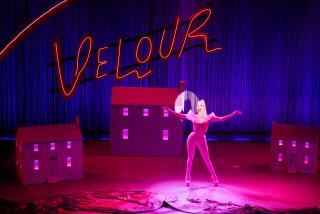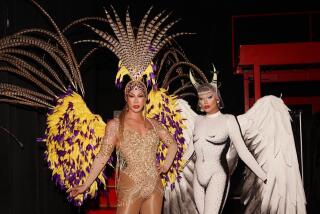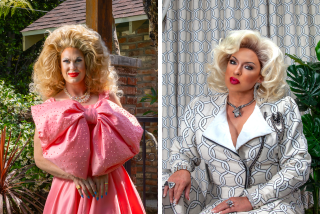‘Wigstock’: Glittery Look at a Drag Party, N.Y.-Style
- Share via
CORONA DEL MAR — Part concert film, part documentary and totally fun, Barry Shils’ “Wigstock: The Movie” captures the good cheer, outrageous humor and high energy of downtown Manhattan’s annual Labor Day drag extravaganza, which surely must exhaust New York of its supply of sequins, feathers, Spring-o-laters--and, most of all, wigs. Wigs as tall as the Statue of Liberty--who remained wigless, but not because festival founder Lady Bunny didn’t try.
Inclusiveness is the hallmark of the glittery occasion onstage and off: Performers may be transvestites, transsexuals--pre-ops included, of course--for that matter, they can even be straight or female. They can be obscure and not very good or they can be a true star, as is the glamorous, justly celebrated RuPaul or the wickedly satirical Lypsinka. And when the talented Joey Arias sings as Billie Holiday yet gets himself up like the last Empress of China, that seems perfectly OK with an audience that couldn’t be more eclectic or enthusiastic: straight and gay, young and old, fat and thin and crossing all racial lines.
Indeed, Wigstock, launched in 1984, outgrew its original Tompkins Square locale in the East Village and last year moved to the Christopher Street Piers, where it drew an audience of 20,000. Wigstock might not be able to happen anywhere else but New York, but there’s something heartening in seeing that, of all things, a marathon drag revue could bring together so many people so joyously. Among the countless entertainers are the musical trio Deee-Lite, L.A.’s Jackie Beat, the formidable Misstress Formika and recording artist Crystal Waters.
Shils’ laid-back, easygoing style suits the sunny summer holiday spirit of the occasion perfectly. “Wigstock” is not trying to be a sharp, incisive film like either “Paris Is Burning” or “The Queen,” and its backstage banter is lighter, less bitchy; but then “Wigstock” is not a competition. There’s no heavy probing of why men should want to dress up like women; these guys just want to because, for them, it’s fun and it expresses how they feel about themselves.
A young African American man explains that when you have to deal with sexism, racism and homophobia every day of your life, Wigstock becomes a great escape. Shils, who combines footage from the 1993 and 1994 Wigstocks, never lets his film get too serious, yet it acknowledges, in touching fashion, the toll AIDS continues to exact in the drag community. “Wigstock” is a hoot, and, as an old man--possibly homeless--remarks, “It’s not hurtin’ nobody.”
‘Wigstock: The Movie’
A Samuel Goldwyn presentation. Director-editor: Barry Shils. Producers: Dean Silver and Marlen Hecht. Co-producers: David Sweeney and Tom Parziale. Executive producers: Klaus Volkenborn, Susan Ripps and Shils. Cinematographer: Tom Priestley Jr. Editors: Michael Ripps and James Mitchell. Costumes: Karen Perry. Music: Marcus Miller. Production design: Ina Mayhew. Set decorator: Paul Weathered. Running time: 1 hour, 41 minutes.
* Opens today at the Port Theatre in Corona del Mar.
* Unrated: Times guidelines: The film has some four-letter words, a gender-bending theme and a glimpse of partial frontal male nudity .
More to Read
The biggest entertainment stories
Get our big stories about Hollywood, film, television, music, arts, culture and more right in your inbox as soon as they publish.
You may occasionally receive promotional content from the Los Angeles Times.










